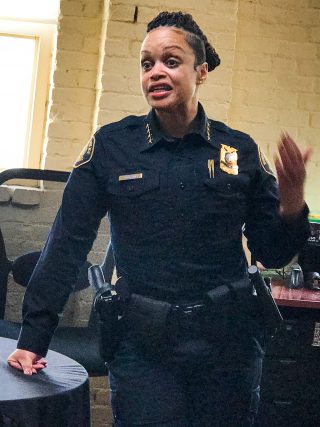
(Photos: Jonathan Maus)
Portland’s 48th Police Chief doesn’t ride a bike because she thinks it’s too dangerous. But her path to pedaling began last night.
Danielle Outlaw shared her fear of cycling in traffic and other thoughts with a small group of people at an invite-only reception hosted by The Street Trust at their headquarters on NW Glisan Street in Old Town last night.
“There are a lot of folks who want a say — but at some point we’ve got to get stuff done.”
— Danielle Outlaw, Portland Police Chief
The event was billed as a way for donors and partners of the organization to meet Chief Outlaw and ask her questions about how her work intersects with transportation issues.
Outlaw has been in her position for seven months, and although she lives just a short drive (six minutes by her estimate) from work, she hasn’t gotten up the courage to go by bike. As if wanting to clear the air from the outset, Outlaw shared with the audience, “I don’t feel comfortable riding on the streets just yet. I actually never have.” She insisted it wasn’t a Portland thing (“I brought this [feeling about biking] with me,” she’d say later) and she also sounded willing to give it a try.
Her inspiration appears to have come in large part from an anonymous young boy she saw biking one morning on her way to work. “He was just five or six years old,” Outlaw shared, “And I’m there with my mom hat on, wondering if his mom or dad is riding alongside him because I was so nervous for him. But he didn’t care. He was so cautious. He crossed the street, in the bike lane… and he did it! And I thought, gosh, if he can do it, I can do it.”
Outlaw specifically mentioned the possibility of riding on Bike to Work Day on May 18th. The Street Trust Board Member David Forman pounced on that opening and offered to lead her on a ride if she was interested (stay tuned).

Becoming a bicycle rider will surely not be the toughest thing Outlaw tackles as she becomes a bona fide Portlander.
Asked about the biggest adjustment she’s had to make since being here, Outlaw gave an answer many readers of this site can relate to: “It’s the ‘Portland polite’ thing,” she said. “I’m learning to navigate through that. I’m very inclusive, process-wise, but because of the Portland polite and the fact that we’re very process-driven, there are a lot of folks who want a say — but at some point we’ve got to get stuff done.”
Advertisement
Asked what could be done to bring speeds down, Outlaw alluded to the bureau’s staffing levels. “The question is, what can we do better to make sure we are visible when we don’t have a physical presence? If we have a photo radar somewhere, what is the follow-up?” Outlaw also talked up the importance of raising awareness and working with other agencies and partners. After officers do an enforcement mission, for instance, she wants to know: “How are we relaying the message to the community that this [enforcement] happened? All these people got cited, now here’s why this can happen to you. Messaging is huge. There are so few [officers], we can only be in so many places at one time.”
PPB Traffic Division Captain Mike Crebs joined Chief Outlaw at the event. As we’ve reported recently, Capt. Crebs has emerged as a strong champion for safe streets. He’s a member of the Vision Zero Task Force and has testified in support of Transportation Bureau policies numerous times.
“The speed issue is near and dear to my heart,” Crebs said last night as he followed-up on comments from his Chief. When he said, “I’d really love if the City of Portland had the ability to set its own speed limits,” referencing the fact that State of Oregon currently has that authority, the entire room erupted in applause.
But of course traffic laws and speed limits must be coupled with an effective enforcement strategy. Chief Outlaw insisted on several occasions last night that all PPB enforcement decisions are “made through an equity lens.” She said she expects all her officers to engage in community policing and that she wants implicit bias training bureau-wide.
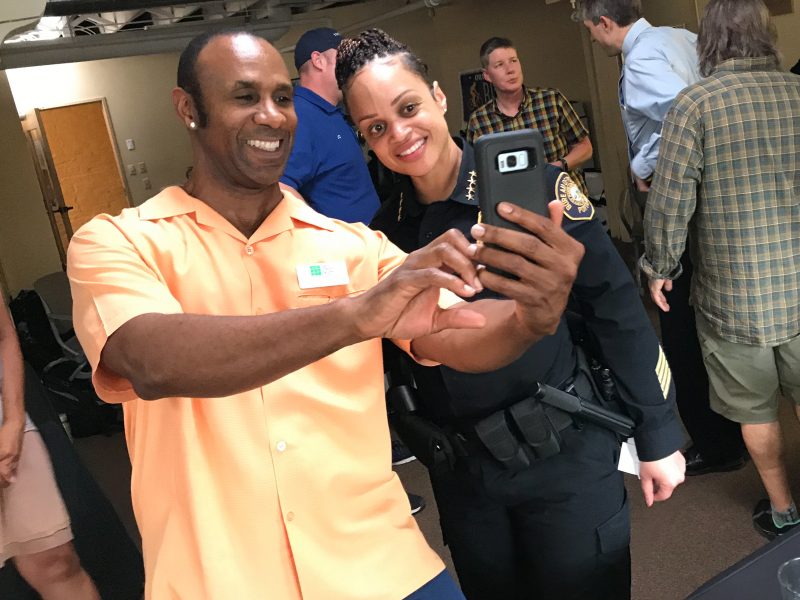
The Street Trust took an important step in hosting this event last night. It’s long past time to rebuild and strengthen ties between transportation advocates and the police bureau.
In the past few years street safety has slipped as a political priority as other serious crises like homelessness, housing affordability, police use-of-force, and social justice issues have dominated headlines and council agendas. Mobility and safety on public streets intersects with many of those issues, and building bonds in our community to tackle them is critical if we want to “get stuff done.”
Last night The Street Trust Executive Director Jillian Detweiler told Outlaw that the existing Transportation Community Policing Agreement (passed in 2009) “has atrophied.” As I shared in a 2015 post that outlined several steps City Hall could take to improve bike safety, I absolutely agree.
Chief Outlaw will hopefully oversee big changes at the PPB. Transportation reform advocates need to be part of them. Last night was a good start.
— Jonathan Maus: (503) 706-8804, @jonathan_maus on Twitter and jonathan@bikeportland.org
Never miss a story. Sign-up for the daily BP Headlines email.
BikePortland needs your support.



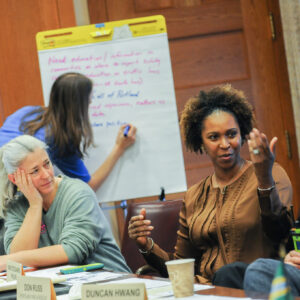
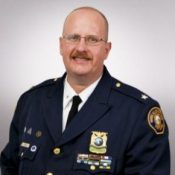
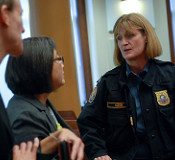

Thanks for reading.
BikePortland has served this community with independent community journalism since 2005. We rely on subscriptions from readers like you to survive. Your financial support is vital in keeping this valuable resource alive and well.
Please subscribe today to strengthen and expand our work.
Judge smiling with Outlaw; I like it.
So sick of the ‘not enough police officers’ reply to every question.
Last time I checked, crime was down by a lot across all categories. Starting with murders: 54 in 1993, 14 in 2016. And corrected for population growth all of the stats would of course be even more dramatic. So why is the ratio we always hear from the police and elected officials cops/population rather than cops/crimes?
http://www.city-data.com/crime/crime-Portland-Oregon.html
https://www.portlandoregon.gov/police/article/29794
In 2012, the traffic division made 35,133 stops. In 2017, they made about 10,000. The traffic division is currently half the size it was in 2012.
https://bikeportland.org/2018/03/07/racial-bias-concerns-and-staffing-shortage-present-enforcement-challenges-for-portland-police-270610
“The traffic division is currently half the size it was in 2012.”
Cause or effect?
The police force certainly wasn’t cut in half over that time period, so this suggests to me that the PPB has decided to shift cops to other pursuits (shooting poor people?). I’d love to understand how this all makes sense.
Thank you.
Somebody quoted the reduction in the overall police force recently. I can’t seem to find it. But yes, the overall number of officers is not half what it was in 2012, so I don’t understand why the traffic division has been reduced by that much.
Crime is down and yet we complain about people speeding and running refs? Hmmm. Although we can never quantify how often those two events happen we do spend plenty of time talking on this board about them. Weird how that works? I also wonder how many are ticketed for driving while distracted?
*^reds
“we complain”
sometimes the ‘we’ is not the same.
I’d say that’s evident but in attempt to not use the “us and them” mentality I tried a more equitable phrase. Oops.
This is too deep for me. What are you hinting at?
We need the cops that it sounds like we’re getting 🙂 historically some folks haven’t liked that idea but I’ll take them in SE portland all day, everyday if the other parts of Portland don’t.
maybe we complain because they’re related… people pointing guns at each other and stabbing each other might be down, but pointing a 2-ton explosion-powered weapon at somebody and you get a Failure to Yield citation instead of a criminal violation… many here think that’s criminal in itself and that those doing the same damage with their motor vehicles should face the same consequences as those doing damage with other weapons…
Wonder how community policing would change the issues you bring up? Can’t wait to find out.
Actually property crime, theft, and auto theft are all up (the kind of stuff that is more likely to slip through the cracks when you don’t have enough police officers).
http://www.wweek.com/news/courts/2017/10/04/fbi-statistics-show-crime-is-flat-or-down-across-portland-except-in-one-key-category/
I was merely quoting the “crime line” that was mentioned to the above statement. I don’t live in a gentrified area so I am well aware of crime.
I’d really love to see the PPD, as well as all other local law enforcement, go back to setting the example when driving. Drive at or below the speed limit, use turn signals well in advance, etc. When I do see police driving around around the city (a rare sight these days, due to the noted staffing issues), they are often passing me, going well over the speed limit. Seems like a pretty cheap (free) way to encourage better behavior from the drivers on our streets.
I didn’t win friends when I brought this up with the police representative of our BPAC… actually, it wasn’t so much when I suggested they start using turn signals and obeying speed limits when not responding to calls, but when I followed up with video examples.
Well to be fair to the police, it’s hard to follow traffic laws when you’re paying more attention to your laptop computer than what’s on the other side of your windshield. (snark off)
This is an amazing win-win. Work it, work it.
Did the Street Trust ask when they are going to recapture Abdulrahman Noorah?
Whoa.. I hadn’t kept abreast of that, but it certainly was predicted (by some). Good on ya for remembering Fallon!
Speed cameras don’t require any additional officers and have no bias.
I’d like a speed camera on my street.
I have made this suggestion at the last SE Uplift meeting I went to. It wasn’t well received.
if someone were to propose a law (or policy) where people of color and immigrant-communities are given severe financial punishment for non-felony violations but wealthier white people would be largely exempt. would you support this law?
imo, those who want ubiquitous enforcement on high crash corridors NOW (without seriously addressing equity) are proposing exactly this kind of institutional racism.
Still waiting for you to respond to a question I posed long ago… thanks for your input though.
I assume this silly rhetorical question isn’t directed at me, but in case it is, I don’t support ‘severe financial punishment’ for speed cameras, unless the speeding is like 20+ over the limit. I’d prefer low, frequent fines from widely-dispersed cameras, sent to the owner of the vehicle and not requiring the driver to be identified.
for someone living paycheck to paycheck often with debt, a minimum $220 traffic fine is a severe financial penalty.
I’m talking like $20-$40, small enough that it’s not worth contesting, but enough to be a deterrent for most people. I think $220 is too much for 5-10mph over the speed limit. If they’re getting a $220 ticket for driving 20mph over the limit, they deserve it. The problem we have now is that enforcement is so rare (traffic stops are now 1/3rd of what they were 6 years ago) that there is almost no deterrent.
I assume you’re also concerned with the financial penalty incurred by a family when someone is hit by a speeding driver, yes?
so we charge a fee that is only a deterrent for low-income people?
imo, this makes the cameras basically useless from a safety perspective while focusing the financial impact on those who can least afford it.
i’ve noticed that when i bring up the need to mitigate the unequal impact of speed cameras on people of color and other marginalized communities i often receive fierce resistance from largely well-off and white bike enthusiasts. until i see a move towards proposals that address equity, i now strongly oppose speed cameras .
And your proposal is?
Not sure why you’re picking an argument with me — I’m asking for speed enforcement in MY suburban neighborhood. We have people blasting down my neighborhood street at 35 or 40mph when my son is trying to bike to school. If asking for a speed camera there is bad, please tell me why. And yes, I think $20-$40 fines (along with the potential bump to insurance rates) would be a deterrent to everyday run-of-the-mill speeding.
how about income-based fines?
https://www.theatlantic.com/business/archive/2015/03/finland-home-of-the-103000-speeding-ticket/387484/
turnips, now we are getting somewhere. in addition to income-based fines i think there are other ways to mitigate the impact of fines. for example, diversion programs and frequency-based fines (e.g. 1 speeding ticket in 10 years — $100 or an easy diversion program; 10 speeding tickets in 10 years — $1000 or community service).
Sounds like we need income-based sliding-scale fines. Drive your Ferrari 10 over through the school zone and pay $12,000; do the same in your ’79 Pinto and pay $50, assuming make and/or model of car is a rough proxy for income level.
i think this is the way congestion pricing should also work. $50 to drive an $80,000 tesla during peak hours and $0 for a 1987 honda vx.
And this is because being passed closely by or being struck by an expensive car is more dangerous than if it happens with an old, beat-up, cheap car? I don’t buy it.
In the same vein, would it be OK to ride on downtown Portland sidewalks or do an Idaho stop on a big box bike, but not on a carbon fiber bike?
How about a speed detector that, when triggered, causes the next traffic signal to skip a green?
I would like there to be so many speed/red light cameras on the public streets, not just of Portland, but all over North America, that drivers get used to the fact that if they speed or run a red light, they will receive a citation in the mail and lose some points on their license. If that happens, drivers will slow down and stop at red lights. No enforcement means the law is almost worthless.
I would like all members of the PPB (and every other law enforcement agency) to spend several hours each week cycling and walking around in areas with reasonably busy traffic. Going from being a strict motorist to being a vulnerable road user might open their eyes and give them some empathy towards the plight of others. I know that I became a much more attentive driver after I started cycling the streets more – but as a cyclist I also became a more attentive rider – trying to be courteous to all other road users. We live in a society after all.
It would be a data-driven process. Cameras should be installed where injuries and deaths are most common, and then spread out to the rest of the city. Equity complaints are not valid if the process is data driven and socioeconomic factors are not considered.
Again, the poorest in our community do not drive. And they have been doing most of the dying on our streets.
All streets are negatively affected by speeding, injuries and deaths aside.
Her fears are warranted, just yesterday my friend was biking to work near downtown, got right hooked by a truck that drove over him and broke his pelvis in three places. Surgery is tomorrow.
i’m very sorry that your friend was injured while biking to work. however, as someone who wants to see driving mode share dramatically reduced it is important to me that we not succumb to the tendency to exaggerate the risks of cycling.
according to american community survey data for 2015 and 2016 ~ 57.8% of portlanders drove alone to to work and around ~6.5% biked to work (1). PBOT recorded 379 serious driving injuries and 39 serious cycling injuries (2).
in terms of serious injuries, cycling to work is 8.4% safer than driving to work.
1. https://factfinder.census.gov/bkmk/table/1.0/en/ACS/15_5YR/S0801/1600000US4159000
2. https://www.portlandoregon.gov/transportation/74093#crash-report
My concern though is having a lot more newbie riders out there who don’t ride like every car is trying to kill them. At every intersection, I pretend the oncoming car is going to run the stop sign. Crossing a four lane road, I pretend the card on the inside lane is going to run the red light. At a crosswalk, I pretend the car that stopped for me is going to get rear ended. This has saved me countless times in all these situations.
This.
Before moving to OR, I lived in a place where cops obeyed the law. One of my buddies worked for the state police and said he’d get in loads of trouble for speeding without a good reason. When I encounter police on the roads, my experiences are identical to what you describe.
When those charged with enforcing the law don’t follow it themselves, it invites contempt for the law.
That the top cop is fearful of using active transportation for a six minute drive says something, but I’m not sure what.
Maybe she’s used to driving? I’ve never seen Oakland on a top place to bike like Portland just was…. hell, does she even own a hike or used one of the Nikey bikes this month? Too many questions as a result of a statement she made amongst a small group of people. As a teacher I was always taught about three key elements- context, context, context.
In all fairness, people who haven’t ridden a bike in a long time can’t just jump on. I’ve gotten a few adults started who literally hadn’t been on a bike in over 20 years. The motor skills and reflexes are well below what you’d expect out of a 10 year old kid, and they’re typically anxious which makes it hard for them to process what’s going on around and causes them to overreact to everything. It takes a little time for them to get into the swing of things.
Complicating things is the fact that nonriders tend to choose upright bikes with terrible handling that amplify control issues.
this…
except for the upright bike part… that was essential… no way drop bars would work… straight riser bars on an old Trek? nope… old English bike with upright North Road bars? nope… once they got on an Electra Townie they had no issues… it was all about the ease of holding on while reaching the ground…
and yes, they were worse than a 10 year old…
and they’re still more anxious about it than a 10 year old, mostly the riding with traffic part…
I recently returned from a trip to Canberra where my brother is a paramedic. He was telling me unless they are responding to a 000 (Australia’s 911) call with lights and sirens, they are required to obey all traffic laws. Parking enforcement will issue a ticket to an illegally parked ambulance or police car (parking enforcement is not part of the police), and the driver of the ambulance/police car will be required to pay for the ticket (or have it withheld from their paycheck).
I think it is a good idea that emergency services obey all traffic and other laws all the time. Responding to an emergency is the only exception – in which case there will be a dispatch record of the emergency to document the need to use lights and sirens.
“The use of unnecessary force in the apprehension of the Blues Brothers has been approved.”
When I drove a pickup truck for the Forest Service, I was required to comply with all traffic laws, including driving at or below the speed limit at all times. Not sure why that wouldn’t be a strict requirement for all government vehicles.
How sad is it that the Police Chief is too afraid to even ride on our streets, and yet seemingly okay with that…?
Not sure what to make of her comments seeing that we were just rated #1 for biking in cities over half a million people. I’m curious if she road a bicycle in Oakland?
““I brought this [feeling about biking] with me,” she’d say later…”
One might deduce from that statement that she didn’t do much biking in Oakland, if any.
I don’t understand the confusion here. Lots of people don’t bike, for multiple reasons, irrelevant of how highly rated their locale is for biking. (I bet there are people in Arizona and Florida that don’t golf…).
That she’s willing to show up to this event, and even commit to a try, is cool.
Yep, the statement she said and we’re are now talking about is taken out of context. It has less to do with our streets and more about her experience level. No need for other’s to over react.
Several spots in Oakland are not unlike Portland – some have door-zone bike lanes, some have ‘green carpet’ sharrows down the middle of streets that are supposed to be low speed, and traffic density and patterns are about the same. The road riding around Grizzly Peak and the Oakland Hills is gorgeous, but I know that’s not the kind of biking we’re talking about here.
Sadly, riding in city environments is always going to intimidate a large number of people, no matter how separated or safe you try to make the infrastructure. The sheer number of cars and pedestrians will always be a factor.
Don’t get me wrong, I’m not saying we should ‘give up the fight’, but I believe it really does come down to education and experience, and most importantly mentoring and ride-leading and bike trains and sheer people influence. That someone (presumably experienced) offered to lead her on a ride to get her started is the single most important key, I believe.
1 catch that has got to change is the problem with our safe passing law. At present it only applies over 35mph. We do a grave disservice to cyclists with this as it forces us to balance whether we want the protections of that law or lower speeds. It’s a ridiculous problem.
Frankly I’m not surprised she’s uncomfortable with the thought of riding given that she undoubtedly knows about the absurdities such as this in our legal code. Law enforcement can only work with the laws they have available, and many of ours fail us spectacularly.
This is one of the reasons I tend to prefer bigger roads. Traffic might be faster and there’s more of it, but sight lines are better for both drivers and cyclists, the flow is more even/predictable, and there’s less of this specific dynamic as well as intentional blocking maneuvers. Another thing I see a lot less of on the bigger roads are motorists who run stop signs when I’m entering or in the intersection of a through street.
Having said that, there’s nothing particularly rare about drivers gunning it to pass me on straightaways and then immediately jamming the brakes for a line of cars at a light so I pass them literally less than 2 seconds after they pass me.
this is why I’m sometimes on Powell instead of Woodward…
Wondering aloud, it would seem our City would have authority to make all greenways no passing.
Do they? As best I can figure, the city can decide NOT to enforce Oregon laws (parking next to intersections), but they can’t decide to go beyond Oregon laws (20mph speed limits). I’m not clear on how it works.
they do the opposite… on streets they’ve designated as a greenway they’ve removed the center lane striping as a convenience to motorists so they don’t feel bad passing us…
i believe the reason they removed the striping was due to the perception that it spurred people driving to treat greenways a collectors/arterials.
I agree with this.
Striping has been added to Kingston in Washington Park and now it looks like a highway, encouraging faster driving. Also, I think many drivers think they are entitled to all of the space between the yellow lines and the fog line, which has been painted on the very edge of the road, making it appear as if cyclists don’t have any legal space to use.
That is incorrect.
If the goal is to get motorist compliance as low as possible, encourage people to do all kinds of dangerous things to get around parades of cars stuck behind cyclists, and provoke ragers, this would be the way to accomplish that.
Being corked behind a car that won’t pass a cyclist grinding 5mph up a “hill” or behind one moving less than 10mph on the flats — sounds awesome.
Did anyone invite her to go fro a ride with them. Or, explain that even with the risk of getting run over, the health benefits of active transportation out way the risk.
If I could get a brave office to ride with me on my way to work, they would have seen at least a dozen drivers speeding in residential areas and school zones, a driver taking notes while driving and speeding, two drivers on their phone in a school zone, 4 red light runners and a failure to yield. Just another average day.
In Sweden, 1970, I observed an effective technique to keep cars from passing too closely. On the rear carrier, there was mounted a horizontal fibreglass pole, with a goodly orange warning pennant, and a sharp pointy brass finial. Any car that passed too closely got an audibale warning vibration on the side of the car. Like the curb feelers that cars used to have.
I kind of like it – drivers don’t like tearing up the paint on their cars. However, wouldn’t you become a rolling bottleneck in the bike lane?
With the way many ebike riders like to close-pass at 30 mph with no advance warning it might be just as useful for bike lanes as well.
I’ve thought of that, but it would need the ability to be lifted up so I could go through narrow areas…
I don’t want to take up all that space when I don’t need to…
The problem is that this method presumes the driver is paying attention to you in first place — that’s not who’s going to hurt/kill you.
I wouldn’t sweat being a bottleneck in the bike lane. Cyclists should cut each other sufficient space. I personally just take the auto lane and am further from who I’m passing than a car typically is.
If you time your passes with gaps in traffic and set up your pass so you’ve already fully accelerated before leaving the bike lane, it literally only takes a second or two and very little space between vehicles, particularly as you approach traffic speeds.
All the same, I don’t think it’s a good idea in crowded areas, near animals, etc. There are better ways to keep people off you.
I’ve found 100 percent compliance with “yield to pedestrian in a crosswalk” when I’m pushing a shopping cart. (I frequently find abandoned shopping carts near bus stops and push them back to the grocery store.) Drivers clearly do not want to scratch the paint on their precious vehicles!
Contrast that with my experience last Wednesday when a friend and I were standing in the lane 8 feet from the curb and had more than a dozen cars speed by before one finally yielded.
I expect this technique would be effective, though it’s easier to just run through gaps than lug a cart around.
Compliance seems connected to location. I find compliance drops dramatically as roads get faster, busier, and wider even with striped crosswalks and medians (close to zero in some locations) — pretty much the opposite of what is needed
Why do police officers feel the need to carry their weapons (handgun, baton etc.) into a meeting at a meeting with a community group? Is there ever a time when they can go somewhere in their official capacity and not carry lethal weaponry?
Probably not, a lot of law enforcement agencies require their members to carry their kit (including sidearm, baton, taser, mace, handcuffs, radio) at all times when on duty (especially uniformed members).
Does a plumber not carry a monkey wrench?
Actually no. A pipe wrench perhaps, but your inclination to compare these two professions is revealing.
I hadn’t heard that there was a rash of plumbers killing unarmed (usually poor) people (with their wrenches). Was there? You probably also know that police in some (many?) countries are not armed to the teeth like our cops are. And somehow they manage.
You’d be amazed how many plumber’s have “monkey wrench” in their business name 🙂
But yes, I want my cops to carry a gun. If that’s revealing then “you caught me.”
Thanks for your input and uncovering my clear statement. 🙂
Hey, you never know where/when you’re going to find someone in the midst of a mental health crisis who needs to be shot.
No one thanks a cop for buying a meal for a suicidal client and transporting them to Unity but it does happen as I witnessed yesterday. Does that make the paper? Does that make the evening news? Not all police officers are Satan. Are there a few that suck? Probably.
But their are plenty who get the power that they have and use it to benefit the community. Also, I’m sure many police officers didn’t go into law enforcement so that they could become frontline mental health therapist so let’s give them a break as well because one thing is for sure, no everyone or diagnosis is the same and we are somehow expecting the police to act the same. From what I can see as a case manager is that they are adjusting to the demands of the community. I wonder how well you would do with that responsibility? It’s easy to say cliche statements when you’re on the sidelines.
I think ‘don’t shoot unarmed people’ would be an excellent starting point. And I’m not at all sure why that should be difficult.
Thanks for you input 🙂
With how many qualified people there are on BikePortland with their constructive criticism, it’s strange to me they are not leaping at the opportunity to be a police officer – they’re hiring!
https://www.portlandoregon.gov/police/article/647793
“2.1. All sworn members shall carry one Bureau-authorized primary firearm, whether in uniform or in plain-clothes assignments.”
AYGYA?
Time and time again Portland police decline to cite people who drive their cars into other people, even when car drivers are clearly at fault. Did no one at this meeting bring up this very recent example? https://bikeportland.org/2018/04/13/collision-on-se-ankeny-at-24th-sends-bike-rider-to-the-hospital-275387
I’d like to hear what the chief thinks about the idea that some people are scared to bike because it makes them vulnerable to attacks like this one:
https://bikeportland.org/2008/06/11/man-on-a-bike-is-tackled-then-tasered-by-portland-police-7846